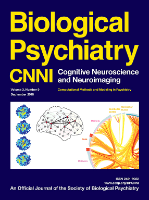
JOURNAL OF PSYCHIATRY & NEUROSCIENCE
Scope & Guideline
Illuminating the Complexities of Brain Function and Mental Disorders
Introduction
Aims and Scopes
- Neurobiological Mechanisms of Psychiatric Disorders:
The journal emphasizes research exploring the underlying neurobiological mechanisms of various psychiatric disorders, including schizophrenia, depression, and anxiety disorders. - Translational Research:
It promotes studies that bridge basic neuroscience and clinical applications, facilitating the transfer of findings from laboratory settings to real-world psychiatric practices. - Innovative Therapeutic Approaches:
There is a consistent focus on novel treatment methodologies, including pharmacological interventions, non-invasive brain stimulation techniques, and psychotherapeutic strategies. - Genomic and Molecular Psychiatry:
The journal covers genetic, epigenetic, and molecular studies that elucidate the biological underpinnings of psychiatric disorders, contributing to personalized medicine. - Impact of Environmental Factors:
Research on how environmental factors, including childhood trauma, substance use, and socio-economic status, influence psychiatric outcomes is a significant area of exploration.
Trending and Emerging
- Gut-Brain Axis Research:
Recent studies increasingly explore the relationship between gut microbiota and mental health, indicating a growing interest in how physiological factors influence psychiatric conditions. - Neuroimaging and Connectivity Studies:
There is a notable trend towards utilizing advanced neuroimaging techniques to study brain connectivity and structural changes in various psychiatric disorders. - Epigenetics and Gene-Environment Interactions:
Research focusing on epigenetic modifications and interactions between genetic predispositions and environmental factors is gaining traction, highlighting its importance in understanding psychiatric illnesses. - Digital Health and Telepsychiatry:
Emerging themes include the application of digital health technologies and telepsychiatry, reflecting the increasing relevance of remote and technology-assisted mental health interventions. - Personalized Medicine Approaches:
There is a rising emphasis on personalized medicine strategies that tailor treatments based on individual genetic, neurobiological, and psychological profiles.
Declining or Waning
- Traditional Pharmacological Approaches:
While pharmacological studies remain important, there appears to be a waning focus on traditional pharmacological approaches without consideration of personalized or integrated treatment models. - Single-Domain Studies:
Research concentrating solely on one psychiatric disorder without interdisciplinary or cross-disorder comparisons is decreasing, indicating a shift towards more integrative research. - Basic Behavioral Studies:
There is a notable decline in purely behavioral studies that do not incorporate neuroimaging or genetic components, reflecting a trend towards more biologically informed research. - Longitudinal Studies Without Neurobiological Correlates:
Longitudinal studies that do not incorporate neurobiological assessments or biomarkers are less frequently published, suggesting a move towards more comprehensive methodologies.
Similar Journals

NEUROPSYCHOPHARMACOLOGY
Transforming Psychiatric Insights into Therapeutic InnovationsNEUROPSYCHOPHARMACOLOGY is a prestigious academic journal dedicated to advancing our understanding of the intricate relationship between psychiatric disorders and pharmacological treatments. Published by SpringerNature in the United Kingdom, this leading journal has been a cornerstone in the field since its inception in 1987, with a converged publication timeline extending to 2024. With a remarkable impact factor and illustrious rankings—being positioned 19th in Psychiatry and Mental Health and 16th in Pharmacology—NEUROPSYCHOPHARMACOLOGY is recognized for its rigorous peer-reviewed research that informs clinical practice and enhances therapeutic interventions. The journal is classified in Q1 quartile categories for both Pharmacology and Psychiatry and Mental Health, highlighting its commitment to excellence. Researchers, professionals, and students are encouraged to contribute to this vital dialogue, as the journal does not currently offer open access, emphasizing the importance of curated, high-quality content. By publishing innovative studies and reviews, NEUROPSYCHOPHARMACOLOGY plays a crucial role in shaping the future of mental health treatments and understanding neurobiological mechanisms, making it an indispensable resource for those at the forefront of psychiatric research.

WORLD JOURNAL OF BIOLOGICAL PSYCHIATRY
Bridging Biological Insights and Psychiatric Care.WORLD JOURNAL OF BIOLOGICAL PSYCHIATRY, a premier academic journal published by TAYLOR & FRANCIS LTD, stands at the forefront of interdisciplinary research in the fields of Biological Psychiatry, Psychiatry, and Mental Health. Based in the United Kingdom, this esteemed journal (ISSN: 1562-2975; E-ISSN: 1814-1412) has become increasingly influential since its inception in 2000, with a remarkable impact factor that reflects its high-quality research contributions. The journal is consistently ranked in the Q1 and Q2 categories across various relevant indices, demonstrating its reputation for excellence within the academic community. With Scopus rankings placing it in the top 20th percentile for Psychiatry and Mental Health, the WORLD JOURNAL OF BIOLOGICAL PSYCHIATRY serves as a vital resource for researchers, professionals, and students seeking to further their understanding of the intricate relationship between biological processes and psychiatric phenomena. Despite being a traditional access journal, it possesses a robust scope that encompasses groundbreaking studies, reviews, and advancements in the understanding of mental health disorders, underlining its importance as a key reference in the advancement of psychiatric science and therapeutic practices.

PROGRESS IN NEURO-PSYCHOPHARMACOLOGY & BIOLOGICAL PSYCHIATRY
Exploring Innovations in Biological PsychiatryPROGRESS IN NEURO-PSYCHOPHARMACOLOGY & BIOLOGICAL PSYCHIATRY, published by PERGAMON-ELSEVIER SCIENCE LTD, is a leading peer-reviewed journal that serves the interdisciplinary field of neuropsychopharmacology and biological psychiatry. With an impressive impact factor in the first quartile of both Biological Psychiatry and Pharmacology categories, this journal provides a critical platform for the dissemination of cutting-edge research and innovative therapeutic approaches. Covering a broad range of topics from the molecular mechanisms underlying psychiatric disorders to advanced pharmacological interventions, it aims to foster scientific dialogue among researchers, clinicians, and students alike. The journal has been at the forefront of scientific inquiry since its inception in 1982 and continues to evolve, adapting to the ever-changing landscape of neuroscience and mental health research. With its focus on high-quality articles and a commitment to advancing the understanding of neuropsychopharmacology, this journal is essential for anyone interested in the complexities of brain function and mental health.

Alpha Psychiatry
Innovative Insights into Psychiatric Disorders and Treatments.Alpha Psychiatry, published by AVES, stands at the forefront of mental health research and psychiatric advancements. With a commitment to disseminating high-quality and impactful studies, this journal serves as a critical platform for scholars, clinicians, and students interested in exploring the complexities of psychiatric disorders and treatment methodologies. Although the impact factor and specific scope details are still evolving, Alpha Psychiatry is dedicated to fostering interdisciplinary dialogue and promoting innovative research that tackles contemporary challenges in the field of psychiatry. As an open-access journal, it ensures that research is widely accessible, enhancing knowledge transfer and collaboration within the global scientific community. Located in Istanbul, Turkiye, the journal proudly represents a rich academic tradition, aiming to contribute significantly to the global discourse on mental health.

MOLECULAR PSYCHIATRY
Shaping the Future of Psychiatry with Cutting-Edge DiscoveriesMOLECULAR PSYCHIATRY, published by SpringerNature, is a premier peer-reviewed journal that has established itself as a leading platform for the dissemination of cutting-edge research in the fields of neuroscience, molecular biology, and psychiatry. With an impressive impact factor and a reputation for excellence, the journal is ranked Q1 in key categories, signifying its high academic quality and relevance. The journal’s scope spans groundbreaking studies and innovative therapeutic approaches that intersect at the molecular and cellular levels, providing invaluable insights into the biological underpinnings of psychiatric disorders. Since its inception in 1996, MOLECULAR PSYCHIATRY has evolved to support both established and emerging researchers, fostering a collaborative environment that enhances the understanding of mental health. It is committed to improving access to scientific knowledge, although it currently does not offer open access options. With its headquarters in London, the journal continues to play a pivotal role in enhancing the global dialogue on psychiatric and neurological advancements, making it an essential resource for academics and professionals dedicated to advancing mental health sciences.

EUROPEAN NEUROPSYCHOPHARMACOLOGY
Connecting Neuroscience, Psychiatry, and PharmacologyEUROPEAN NEUROPSYCHOPHARMACOLOGY, published by Elsevier, is a prestigious academic journal that serves as a cornerstone in the field of neuropsychopharmacology, embracing multidisciplinary research at the intersection of neuroscience, psychiatry, and pharmacology. Since its establishment in 1990, this journal has consistently delivered cutting-edge research and reviews that drive forward our understanding of central nervous system disorders and their treatment. With an impressive impact factor and ranked in the Q1 category for several disciplines, including Biological Psychiatry and Neurology, it attracts submissions from leading researchers globally. The journal’s Scopus rankings reflect its significant influence, ranking in the top echelons across various categories such as Medicine and Neuroscience. While the journal maintains subscription access, readers are encouraged to explore the breadth of important findings that contribute to advancements in treatment options and improve patient care. EUROPEAN NEUROPSYCHOPHARMACOLOGY not only supports the dissemination of pivotal research but also fosters collaboration and dialogue within the scientific community, making it an essential resource for researchers, clinicians, and students dedicated to the complexities of brain health.

Archives of Psychiatry and Psychotherapy
Bridging Theory and Practice in PsychiatryArchives of Psychiatry and Psychotherapy is a distinguished journal published by the Polish Society of Psychiatry, focusing on the dynamic fields of clinical psychology and psychiatry. Established in 2001 and continuing through 2024, this journal serves as a platform for the dissemination of significant research findings, theoretical advancements, and practical applications in the realm of mental health. With its ISSN 1509-2046 and E-ISSN 2083-828X, it stands out for its commitment to enhancing the understanding of psychiatric disorders and treatments. While it currently reflects a Q3 ranking in Clinical Psychology and a Q4 ranking in Psychiatry and Mental Health, its growing impact and visibility in academic circles are evident from its Scopus rankings, placing it within the 28th and 24th percentiles of its respective categories. The journal emphasizes open access, promoting equitable access to valuable knowledge for researchers, practitioners, and students alike, thus fostering collaboration and innovation in the field. As the mental health landscape evolves, the Archives of Psychiatry and Psychotherapy remains an essential resource for those dedicated to advancing psychiatric practice and research.

Psychiatria Polska
Transforming insights into impactful psychiatric solutions.Psychiatria Polska is a distinguished journal published by WYDAWNICZY POLSKIEGO TOWARZYSTWA, focused on advancing the field of psychiatry and mental health. Established in 1967, this journal has become a vital resource for researchers, clinicians, and students, contributing to the understanding of psychiatric disorders and their treatments. With an ISSN of 0033-2674, it features a diverse range of studies, case reports, and reviews, making it an essential platform for sharing innovative findings within the psychiatric community. Although currently categorized in the Q3 quartile for both Medicine (miscellaneous) and Psychiatry and Mental Health in 2023, its increasing impact is evidenced by its Scopus ranking of #345 out of 567 in its category, placing it in the 39th percentile. Located in Cracow, Poland, Psychiatria Polska continues to foster international collaboration and knowledge exchange, despite being non-open access, ensuring that its high-quality content reaches a wide audience. This journal is dedicated to enhancing the dialogue on mental health, making it an indispensable resource for those committed to improving psychiatric practice and research.

Biological Psychiatry-Cognitive Neuroscience and Neuroimaging
Exploring the Intersection of Mind and BrainBiological Psychiatry-Cognitive Neuroscience and Neuroimaging is a leading interdisciplinary journal published by Elsevier, focusing on the convergence of biological psychiatry, cognitive neuroscience, and advanced neuroimaging techniques. With its prestigious Q1 rankings across essential categories such as Biological Psychiatry, Cognitive Neuroscience, and Neurology (clinical), this journal is at the forefront of research that examines the complexities of mental health through innovative methodologies. Covering a broad spectrum of topics from neurobiological mechanisms to clinical applications, it aims to provide a platform for scholars and practitioners to exchange insights on mental disorders and their neurobiological underpinnings. The impact factor and Scopus rankings further underscore its importance, with rankings highlighting its position in the top percentiles of related disciplines. By fostering an open exchange of ideas and promoting cutting-edge research, this journal is an essential resource for researchers, professionals, and students dedicated to advancements in the understanding and treatment of psychiatric and neurological conditions.

Rivista di Psichiatria
Uniting Disciplines for a Comprehensive Approach to PsychiatryRivista di Psichiatria, published by PENSIERO SCIENTIFICO EDITORE, stands as a significant contributor to the field of Psychiatry and Mental Health since its inception in 1975. With an ISSN of 0035-6484 and an E-ISSN of 2038-2502, this esteemed journal offers a platform for rigorous academic discourse and cutting-edge research, helping to shape contemporary psychiatric practices and theories. Currently holding a Q2 designation in Psychiatry and Mental Health based on the 2023 category quartiles, and ranking #197 out of 567 in Scopus, it reflects a commendable 65th percentile among its peers. The journal welcomes contributions that encompass a broad range of topics related to mental health, encouraging contributions from a multidisciplinary approach, which aids in its goal of advancing the understanding and application of psychiatric science. While it is a traditional journal without Open Access options, access to its valuable content can support researchers, clinicians, and students in their pursuit of knowledge and innovation within the field. Situated in Rome, Italy, at VIA SAN GIOVANNI VALDARNO 8, ROME 00138, the journal continues to enhance its rich legacy, promoting the exchange of ideas and fostering collaboration amongst practitioners and scholars alike.